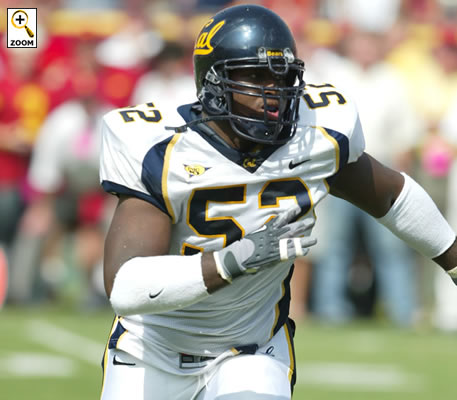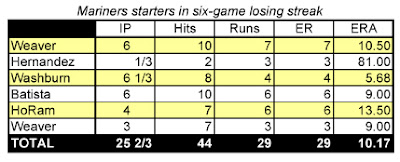 This is a post I've been working on for a few days now, so don't take it as a reaction to the Mariners' recently completed two-game mini sweep of the A's. I'm as ecstatic as the next M's fan that the team was able to salvage this road trip with three consecutive wins.
This is a post I've been working on for a few days now, so don't take it as a reaction to the Mariners' recently completed two-game mini sweep of the A's. I'm as ecstatic as the next M's fan that the team was able to salvage this road trip with three consecutive wins.
While it's great that they get to hang around the top of the worst division in the majors for the time being, but I'm seeing a lot of disturbing things that make me wonder how long this can last.
It's a long post, but if you hang around, I think it'll be worth your while.
Ted Williams' first commandment of hitting is "Get a good pitch to hit." It seems so simple -- you increase your chances of hitting a ball well if you swing at a pitch that you can handle in the strike zone -- yet the Mariners completely fail to grasp this concept. Common sense also tells you that the more pitches you see every time you come up to bat, the more likely you are to get a good one to hit.
Most of the Mariners hitters seem to have missed this lesson somewhere in Little League. As it turns out, the perception that the Mariners do not have patient hitters is an absolutely correct one, and probably the biggest reason to be pessimistic about this team's long-term chances this year.
The stat people point to most often as evidence of the Mariners' lack of patience is the team's on-base percentage (OBP), which is tied for last in the American League at .304. (For comparison purposes, that would be like having a batting average of .200.) The Mariners have just 33 walks in 17 games -- on pace for roughly 314 walks this season. For another comparison, consider that the next closest team in walks -- the Minnesota Twins -- are on pace for 434. The Chicago White Sox, currently leading the league, are on pace for 720.
What does that mean? If you just look at the raw numbers, the White Sox will get roughly 400 more free base runners this year than the Mariners will. That works out to about two or three more base runners per game -- two or three more guys who potentially could come around to score.
But walks alone don't tell the whole story. After all, if you use your patience to get a good pitch, as Williams suggested, then punish the ball -- as Williams often did -- you can put up great offensive numbers without huge walk numbers. There are numerous examples this year of teams scoring lots of runs without great walk numbers; for example, two of the top three AL teams in runs scored (Devil Rays, Tigers) are middle of the pack in OBP.
The problem is that the Mariners don't really do that, either, and here's a big reason why: The Mariners see the fewest pitches per plate appearance (P/PA) of any team in the majors.
On average, the Mariners see 3.61 pitches per plate appearance. The league average is 3.80, and Cleveland leads the AL at 4.04. What does that mean? Since the average team has about 42 plate appearances in the average game, the average team sees about 160 pitches per game. The problem is that because the M's take so few walks, they have much fewer plate appearances than other teams -- they only get about 36 plate appearances per game so far this year. That means the M's only see about 130 pitches a game.
Think about that:
- That's 30 fewer opportunities for a pitcher to make a mistake that a hitter can hit;
- Thirty fewer pitches a pitching staff has to throw over the course of a particular game, allowing opponents to use fewer pitchers and keep their best pitchers in longer;
- And roughly 90 fewer pitches over the course of a series that an opponent has to throw, allowing them not to have to burn up their bullpen.
Remember, we're only talking about the
average here. That, my friends, is what we call
HUGE, and it's supported by
this study by Dan Fox over at The Hardball Times.
While Fox notes that it's possible to be successful and see a relatively few number of pitches per at bat -- Vladimir Guerrero, Nomar Garciaparra and Vernon Wells were notable in his study with P/PA of less than 3.4 -- he found that there was a strong correlation between offensive production and P/PA, particularly when it came to OPS (OBP plus slugging percentage, a good indicator of an individual's overall offensive contribution to a team). He notes that while high P/PA is no guarantee of success, it certainly helps.
Casual observers probably would classify the M's lineup as being full of "aggressive" hitters. As Fox showed, it's not bad in and of itself to be an aggressive hitter. However, only very good hitters can get away with being overly aggressive, occasionally swinging at pitches outside of the strike zone.
The problem comes when
marginal hitters become overly aggressive. Then you become a hacker, flailing away at any pitch that comes anywhere near the strike zone -- the biggest problem for the Mariners, as anyone who's watched them for any amount of time would attest. In the latter circumstance, you're not likely to hit balls hard -- quite the contrary, you're more likely to swing at a pitch outside of the strike zone and get yourself out.
The moral of the story as it applies to the M's?
A team can get away with having a handful of hackers, but the Mariners' lineup is stacked with them. The only two players on the Mariners' roster who see above the league average in P/PA are Ichiro and (proving that high P/PA is no guarantee of success) Richie Sexson. The other seven guys qualify as hackers -- and that includes reputed "patient" hitter Jose Vidro, who saw just 3.5 P/PA the last two years.
The reality is that any one of these hitters might be a very nice cog in another lineup. Unfortunately, this Mariners lineup is the baseball equivalent of "bad chemistry" in basketball or football -- it's a bad combination of hitters that, together, are going to have an extremely difficult time being productive.
Incidentally, this is something that General Manager Bill Bavasi should have seen coming, and yet another example of why he's so very inept at what he does. The M's offense was supposed to be improved, and if you simply look at the addition of numbers like home runs and average from the new players, it is.
But look deeper at additions such as Vidro and Jose Guillen -- each 3.5 P/PA the last two years -- to a lineup that already was filled with impatient hitters, and you've got a lineup that, on the whole, is not improved.
And, I'm sorry to tell you that it probably won't improve, either -- these guys are all just doing what they've done throughout their career.
















